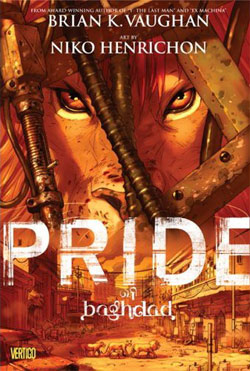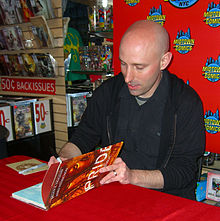LET'S COMMIT VANDALISM
I just read Brian Vaughan's Pride of Baghdad, which I bought in 2010 and had yet to read, if that gives you any idea of my backlog. First: Vertigo published this graphic novel, so you know it's not for all YA, as Vertigo is DC Comics' division for more mature material, such as the masterful 100 Bullets, Hellblazer, The Sandman, and Vaughan's own Y: The Last Man. That's all hard-boiled material, so keep this in mind before sitting your toddler down to look at the book with the talking lions.* There's implied lion sex, lion sexual assault, lions arguing, and lots of lion and bear blood, but there isn't a lot of cursing, so in our culture, this story is acceptable for broadcast television, but should only be read by people 17 and over.
Vaughan bases this novel on the story of starving lions who escaped the Baghdad Zoo after American bombing raids in the 2003 invasion, and creates an allegorical narrative for the multiple perspectives of people in Iraq regarding what to do with their newfound "freedom." I find this graphic novel to be too short without being succinct, and perhaps too vague for young readers to readily interpret, but it may work well with older students in using their reading and social science skills to parse out which general perspective on war and freedom each character represents, and how those perspectives compete in modern Iraq and/or in general. This is a difficult topic to write about, and the execution is choppily incomplete, but the concept is brilliant, and I applaud Vaughan for trying. Lions are neato. And now for the fun.
In the spirit of explosions and destruction and realizing new possibilities, let's vandalize the Wikipedia article for this book. Below, you'll find a copied version of the article with my edits, that will be removed from Wiki in, I don't know, six seconds after I post. So, I'll preserve them below to honor our fallen lion friends. The original text will be in black; anything I strike looks like this; my additions are in red. I haven't done this kind of thing in a few years, so bear with me as I shake off the rust and make jokes. I used to do a lot of "writing" over at Uncyclopedia, a glorious time-waster in terms of making fun of our dumb world and/or just being silly.
*Note to self: Sneak Pride of Baghdad into my nephew's pile of Lion King coloring books. Watch him quickly become a raving lunatic.
EL BARTO
Pride of Baghdad
From Wikipedia, the free encyclopedia
with tight controls on what information gets to appear, so if you think about it, not really that free, eh? DID I JUST BLOW YOUR MIND?
| Pride of Baghdad | |
|---|---|

Cover to Pride of Baghdad
Caption by Captain Obvious
| |
| Publication information | |
| Hitchcock Film- Inspired Publisher | Vertigo |
| No Genre | |
| Publication date | September 13, 2006 |
| Creative team | |
| "Writer(s)" | Brian K. Vaughan |
| Artist(s) | Niko Henrichon |
| Letter | |
| Editor(s) | Will Dennis? Maybe. Casey Seijas |
Pride of Baghdad is a graphic novel thinly-veiled allegory written by Brian K. Vaughan and illustrated has pretty pictures by Niko "McBrain" Henrichon released by DC Comics' Vertigo imprint on September 13, 2006.[1] The story is a fictionalized factual account of the fictionalized true story of four African lions that escaped from the Baghdad Zoo And Pub after an American bombing in 2003. The book won the IGN award (whatever that is) for best original graphic novel in 2006.[2]
- 1 Plot
- 2 Production
- 3 Characters
- 3.1 Main characters
- 3.14 Pi
- 3.2 Secondary characters
- 3.3 Tertiary characters
- 4 Reception
- 5 References upon request
- 6 No one reads this section
Plot[edit] [Don't mind if I do!]
The story, much like Mars, revolves around the brief freedom experienced by a small modest pride of captive lions, who escape from Baghdad Zoo during the 2003 invasion of Baghdad by the U.S.-led coalition, which you learned by reading the introduction to this article. Please, accept our apologies for being superfluous. As the lions roam the streets of Baghdad trying to survive arguing philosophies of self-determination and the nature of man in relation to establishing government about food, each lion comes to embody a different, underdeveloped viewpoint regarding the Iraq War, and a turtle yells at them for being naive.[3]
Production Anecdote[edit]
Speaking on the decision to publish Pride of Baghdad as a single volume rather than the more common serial form, Vaughan stated, "I wanted readers to experience the suddenness with which these animals' lives were changed and that worked much better in a story that can be read in one sitting to give me all their money at once...the learning curve for writing a 136-page self-contained novel and installing my new hot tub was steep, but I'm thrilled with how it turned out."[4]
Characters and a boatload of spoilers[edit]
Main Mane characters[edit]
- Zill, the alpha male (and only adult male) of the pride. Though usually mild-mannered, he begins to show signs of aggression and proves to be a competent fighter when threatened, and tells the same story over and over about being able to see the horizon, an obvious symbol of freedom.
- Safa, an old lioness who is blind in one eye and has a torn ear. She has become accustomed to captivity and views the human advantage of their new freedom. It is implied that she once used to be Zill's mate (rawr!). Her remaining eye is clawed out in a fight with Fajer. At the end of the story, she is shot dead by U.S. soldiers after trying to protect Noor and Ali.
- Noor, a younger lioness, mother to Ali (mama named him Clay; I'ma call him Clay), and Zill's current mate. She longs for freedom from the zoo. She and Safa rarely agree, and they often fight verbally.
- Ali, Noor's young cub, a Simba impersonator who is unceremoniously shot to pieces.
Secondary characters[edit]
- Bukk, a lion from Safa's past. He is the one who blinded her and mutilated her ear after she clawed him and proceeded to rape her before allowing his brothers to do the same. This represents Iraq's previous autocratic governments and I've now read consecutive books with gratuitous rape scenes. Excuse me while I vomit.
- Bukk's brothers, Bukk's brothers appear in Safa's memory about her past. They took turns raping her after Bukk did so. Christ almighty, do we already need a reminder?
- An unnamed sea turtle who speaks with Safa and Ali about the past war and plays the resigned, grizzled old-timer archetype brilliantly. Vaughan stated, "At first I wanted more of a wacky neighbor archetype, but a scheming sea turtle named Kramer was too far-fetched.
- Fajer, a blood-thirsty bear who challenges the group to Pictionary. He eats most of the meals intended for Rashid, leading to the latter dying of starvation, representing the political and social elite loyal to the dictatorships. He is first encountered by Safa and Noor, who attempt to bring him down; their failed attack results in him clawing out Safa's only good eye, rendering her
fully blindeven more grumpy than usual. Before he can move in to kill a woundedNoorknee, Zill appears and challenges him to hopscotch. Fajer initially has the upperhandpaw, but Zill gouges hisnosecustomers before tackling him through a wall and onto the street below. Seriously injured, Fajer continues to mock the lions' nature because he's rich and greedy, remember?, at which point Zill signals Ali to scare a group of horses into a stampede which crushes Fajer multiple times. Near death and in tremendous pain, Fajer begs the lions to kill him becomes personified irony, which Zill refuses, believing a quick death is too good for him. They leave him to die slowly in agony. - Rashid, a tortured pet lion on the verge of death. He passes away due to starvation as Fajer ate all of the meals intended for him. Seeing him in such a horrible condition results in an argument between Safa and Noor. Noor claims that
humansSaddam Hussein!!!!!! did this to him, but Safa retorts by saying that while humans kept them captive, they were not torturers, at which point the ghosts of John Locke and Thomas Hobbes appear and everyone runs away screaming. Noor responds by saying that no matter what, those that would hold them captive are always tyrants and that if they had remained in captivity,sooner or laterthey would've continued to pointlessly squabble until they wound up like Rashid. At this point, Fajer enters,violentlyclaiming that Rashid was a spoiled pet that lived as comfortably as the lions ever did at the zoo. Oh, SNAP.
Reception[edit]
IGN named Pride of Baghdad the Best Original Graphic Novel Depicting Lions of 2006, calling it a "modern classic slow year", and commenting that the book "can be enjoyed on several two levels. Those wanting a 'simple' tale of survival and dysfunctional family will find that. Those wanting a powerful, gripping analogy of war will find that as well elsewhere. Writer Brian K. Vaughan was also careful to avoid pinpointing any one particular viewpoint - each lion sort of represents a different attitude, which is refreshing since many books do not allow that choice, as it's a well-established fact that reading a book inhibits the decision-making part of the brain. Featuring stunning artwork by Niko Henrichon, there is no way any comic book reader should pass up this graphic novel."[3] Dorkgasm (A Time Warner subsidiary) described it as "one of the most poignant anthropomorphic stories since Animal Farm; Charlotte's Web can go pound sand."[5]
References[edit]
- ^ Pride of Baghdad at VertigoPsychoRearWindow website
- ^ IGN Best Comics of 2006
- ^ a b IGN.com presents "Best of 2006: Decent Original Graphic Novel". IGN. Retrieved March 17, 2012.
- ^ Dave Richards (September 11th, 2006) The Joy of Pride: Vaughan talks "Pride of Baghdad" and mortgage amortization", Comic Book Resources, accessed May 10, 2013
- ^ Michael C. Riedlinger (August 28, 2007) CRITICAL ANALYSIS: PRIDE OF BAGHDAD - Conflict Begets Conflic, Dorkgasm.com, accessed by someone who admits to looking at something called "Dorkgasm"
External links no one will ever click[edit]
- Official MySpace page for Pride of Baghdad Haha! Brilliant joke! Oh wait, it's real.
- A visual step-by-step from Niko Henrichon, the book's artist
- Brian K. Vaughan's Roaring Pride, Publishers Weekly, June 20, 2006.
- BBC News US troops kill Baghdad lions
- "CNN" What's a Battle?
- The Joy of Pride: Vaughan Talks Pride of Baghdad, Comic Book Resources
NEXT TIME, I YELL ABOUT
You know what? I haven't yet decided. I'll get back to you. Let's just say IT'S A SURPRISE!
BORING STUFF
Brian K Vaughan
2006 Vertigo








